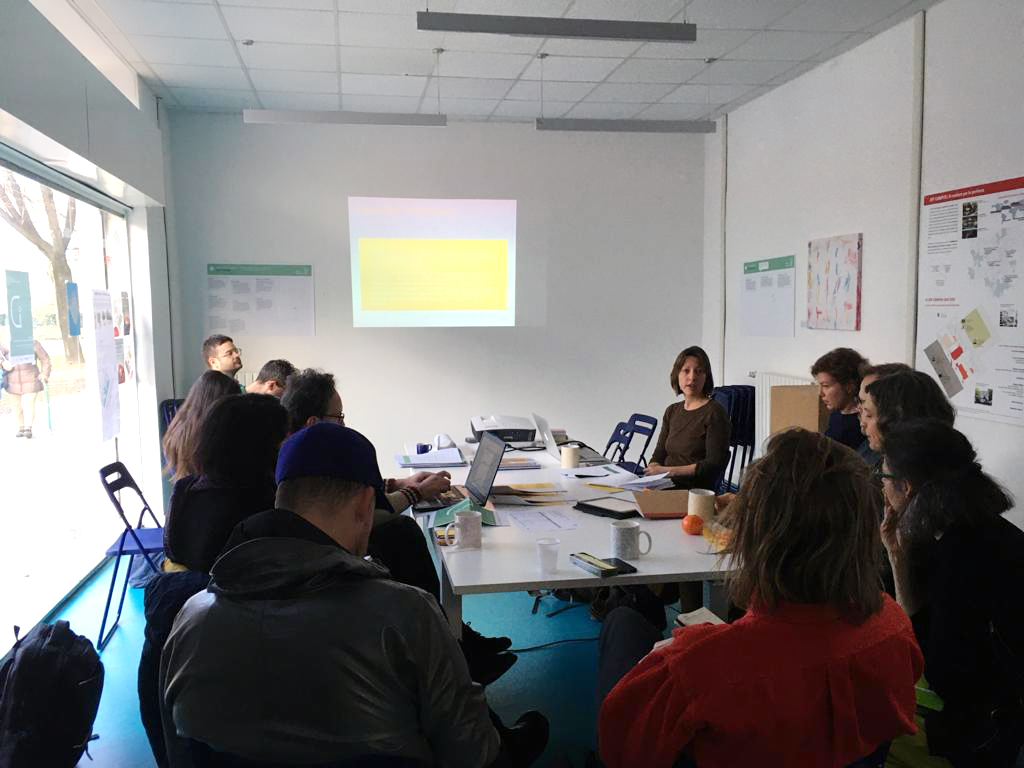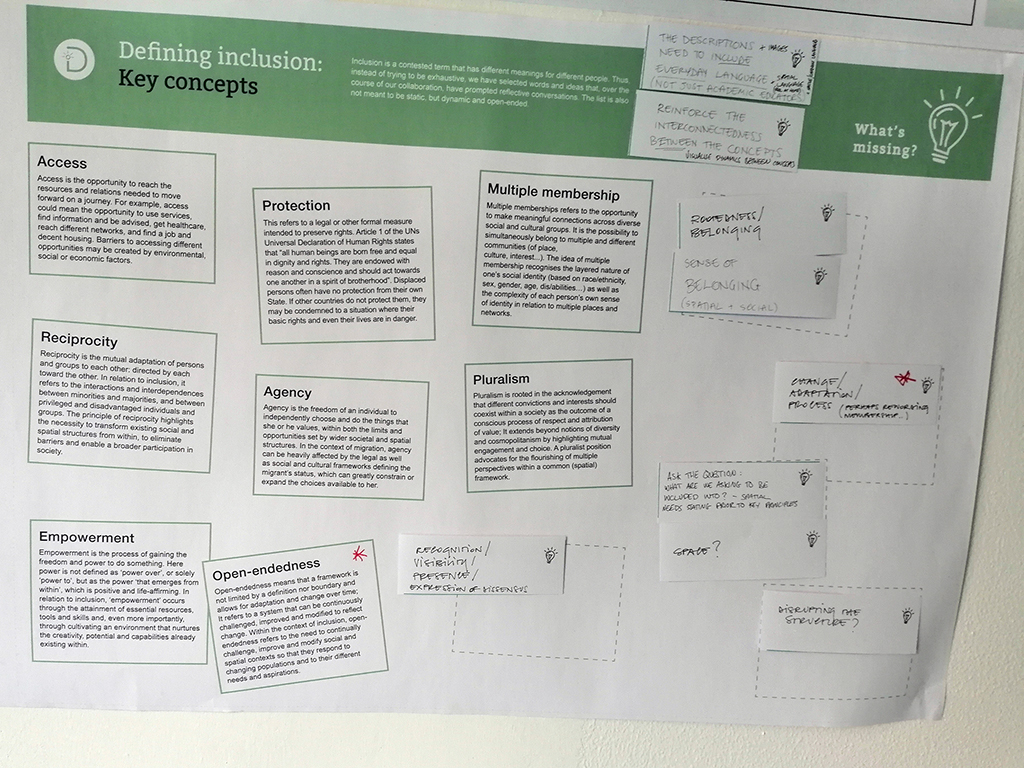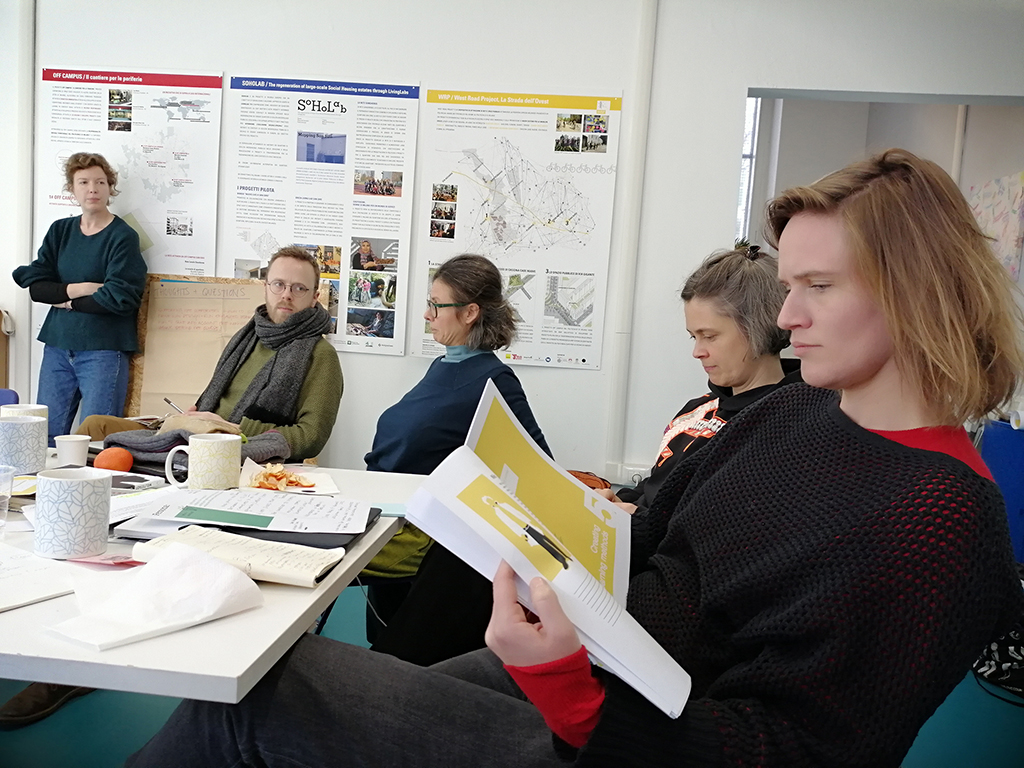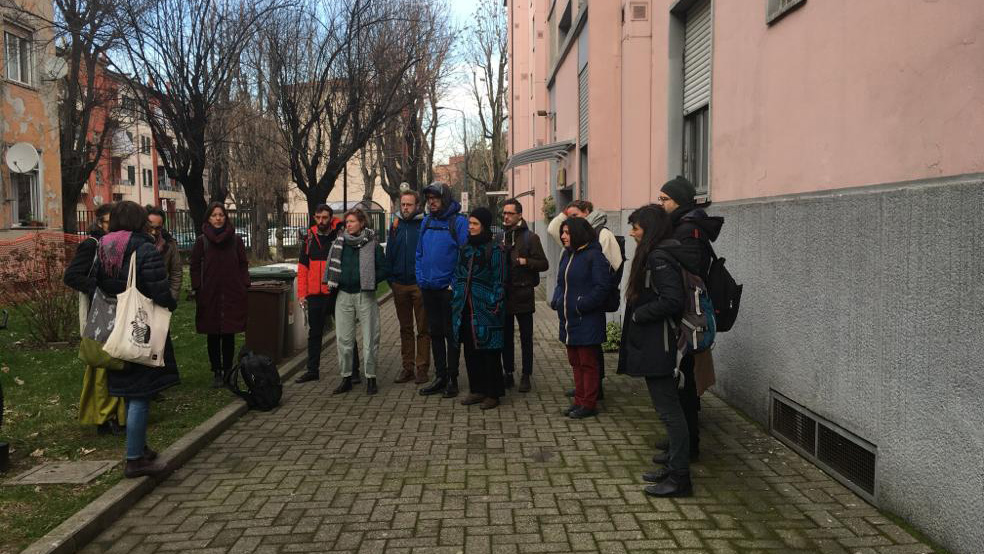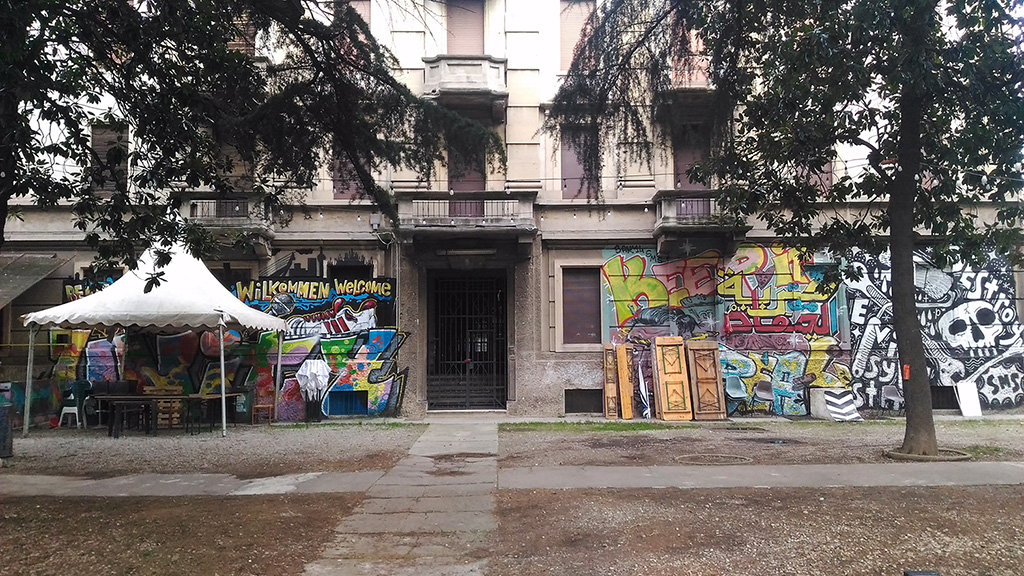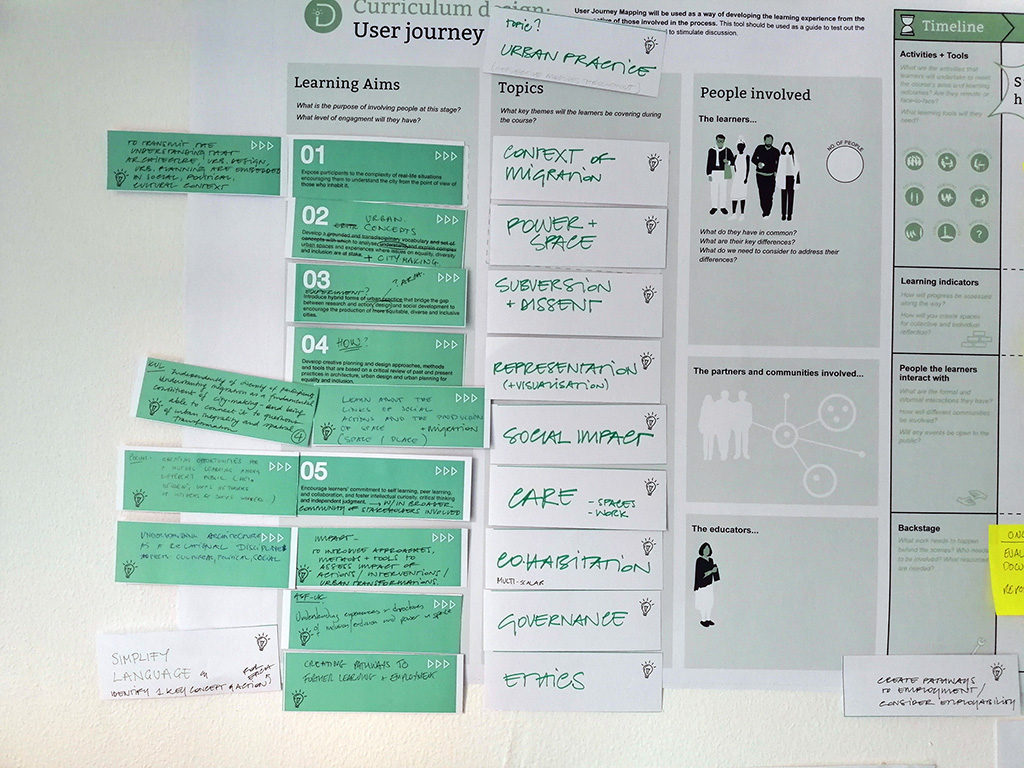Milan, 21 – 23 January 2020
Day 1
The starting moment of the training followed a series of aims: presenting the work and outputs of the previous Designing Inclusion (DESINC) project; analysing and updating the key principles already identified within DESINC; producing a shared vision on the key principles and values underpinning the learning practices that will be implemented during DESINC LIVE.
The University of Sheffield (UoS), together with UK Leuven and ASF-UK, introduced the audience – in particular the new partners – to the structure and outcomes of DESINC, with special regard to its two main products, i.e., the reports Pedagogies of Inclusion Vol.1 & Vol.2. During the presentation, the speakers highlighted how the content of the two reports should serve as a starting point for the activities of DESINC LIVE. One of the general purposes of the new project, in fact, is to test the validity of the Intellectual Outputs achieved during the previous experience.
The first step suggested is to carry out some of the activities proposed in Pedagogies of Inclusion during the training event itself, in order to facilitate collective discussion and workflow towards the design of the joint educational offer, which is expected to represent the main outcome of DESINC LIVE.
All the participants shared their thoughts, insights and reflections on the two reports, highlighting their strengths and identifying what requires to be articulated further. Thanks to the contribution of the civil society organisations (CSOs) involved in the process (Refugees Welcome Italy – RWI and Schlesische27 – S27) special attention was devoted to the issue of asylum seekers and their management all over the European continent. Due to the fact that undocumented and rejected asylum seekers were relatively underrepresented in the two reports, RWI and S27 highlighted the need to think of the way reception differs in the various countries.
Reflecting this concern , a second point of discussion was the need of reaching a close cooperation between CSOs and HEIs, in order to overcome taken-for-granted educational ‘recipes’ (especially towards more engagement) and respect the specific needs of those with whom the CSOs have been working (e.g. by ensuring some durability and certification of the educational path).
Lastly, Politecnico di Milano shared thoughts and reflection on the notion of action-learning, a core methodological tool implemented for some years by the action-research group Mapping San Siro. This approach will also be applied within the educational offer that DESINC LIVE will design and experiment.
After this recap and the consequent relaunch of the DESINC LIVE activities, all the partners worked on the refinement and amendment of the definitions of ‘inclusion’ already produced during DESINC. Once divided into small groups, all the participants received blank cards and filled them with proposals for both new and potentially different definitions of inclusion, as well as changes or refinements of the existing ones. A collective discussion on the definitions allowed to better focus on several concepts, whose meaning has been broadened thanks to the contribution of the new partners; in some cases, different perspectives have been added, such as the one that sees inclusion as the satisfaction of the need to feel rooted in a specific social environment. This specific point has been raised in relation to the experience of people entering the reception system all over Europe, who, after a long journey depicted by KU Leuven during the previous activity, generally express the wish to feel at home as a means of reaching social inclusion.
After this activity, all the participants discussed the key principles that should support the future educational offer. Everybody agreed on the need to reach an offer that is challenging for both the teacher and the learners and aims to engage in a process that has been defined as ‘unlearning/learning’. In addition, the educational process should allow to critically discuss the knowledge accumulated by participants over time, in order to give space to new insights, ways of thinking and understanding of the issues related to the creation of an inclusive urban space for migrants, asylum seekers and refugees. Therefore, our educational offer must be collectively produced, open to intuition and focused on the comparison between different places and social contexts, as well as being capable of making people think outside the ‘box’ of taken-for-granted worldviews.
The afternoon was devoted to site visits and talks with educators and social workers engaged in inclusion projects in Milan. There were two reasons behind this activity. First, we consider that it is not possible to design an educational offer on migration and inclusive urban spaces without ‘entering the field’ and looking at the different local practices. The knowledge of existing projects and practices will have the fundamental function of providing a ‘database’ of case studies, from which to extract the main content of the educational offer. Secondly, as we want to propose a challenging, interactive and engaging offer, the teachers involved are supposed to confront the peculiarities of local experiences. Visiting the site of different social programmes and practices will thus serve as both a training moment for the partner institutions and as a set of actual experiences, around which to design the offer.
Since the staff training in Milan was oriented mainly on economic migrants rather than asylum seekers, the site visits reflected this focus. The afternoon started with a speech by the researcher Guido Belloni from the Codici Ricerche cooperative, who introduced the audience to the current Italian migration landscape. After some general remarks, Belloni focused on migration in Milan and stressed the need to think of migration in a perspective that includes inequality as a lens, through which one can look at the dynamics at stake.
The project experience is very diversified and has different levels of formality. It is run by the Dar/Casa, Spazio di Mutuo Soccorso and Spazio Aperto Servizi cooperatives. Dar/Casa is a social cooperative that has been implementing a project in cooperation with the city council of Milan and ALER (the regional agency for public housing), addressing those who cannot afford the rent of a dwelling on the private market. Italian and migrant families are enrolled in the project after being included into a waiting list; once entering a flat, the families refer to the operators of Dar/Casa, who assist them in dealing with daily tasks and problems. This social work provides beneficiaries with the opportunity to be accompanied in the process of rooting in the city and completing an inclusion process, which would otherwise be much more complicated.
Spazio di Mutuo Soccorso (SMS) is a completely different case, generated after the occupation of a public building. The network of migrants and Italian activists, that first occupied the building, share the responsibility of maintaining the structure, repairing and enlarging the common spaces, and creating the opportunity for education, sports and collective activities inside the structure. A longstanding relationship with the city council has served to prevent eviction and to gain some public recognition, as a pilot experience of engagement of migrants and undocumented asylum seekers. The aim of SMS is to sustain and encourage engagement, cooperation and political action in order to tackle the housing problem affecting migrants and their families.
Lastly, Spazio Aperto Servizi has been running a project for unaccompanied minor migrants (MSNA) in their path towards integration in the city. The cooperative manages flats hosting young men, generally coming from Africa, and accompanies recipients along their path to autonomy and adulthood. The DESINC LIVE partners had the opportunity to enter one of these houses, meet the inhabitants and listen to the educators and social workers explaining their work and its complexities.
Day 2
During the morning, the participants went deeper into the learning aims of the individual universities and partners from civil society organisations. Working in smaller groups we revised the learning aims explored during the DESINC project, and developed them further in the light of feedback and input from the new partners, in particular CSOs (S27 and RWI).
An important acquisition during this session was about the relevance CSOs attribute to work through concrete undertakings, which allow different and multi-level forms of learning to take place, thus broadening the notion of learning beyond the perimeter of ‘formal’ architecture and design education.
The need of creating opportunities for mutual learning among different social groups (i.e. students, HEI teachers, local networks of citizens, social workers) was thus further articulated. Another crucial point in the process was the need to establish a shared vocabulary of urban concepts as a support to the analysis and the experience of city-making processes, relating to issues such as equality, diversity and inclusion. Language and communication play a major role and need to be simple, straightforward and targeted at a diverse audience.
The second part of the day focused on articulating possible topics and contents for the educational offer that will be developed. The participants were asked to reflect on the different housing projects visited during the first day and to use their goals, experiences and approaches, as source of inspiration for the creation of educational content. Everybody was then asked to make individual proposals on different themes and categories, to which the educational offer will have to respond to. Accumulating the different proposals eight topics or categories were developed: Context (of Migration), Power & Space, Actors and Governance, Subversion & Dissent, Co-habitation, Care, Ethics, and Representation.
At the end of the second staff-training day and in order to design an educational offer, the participants were asked to revise the character types (‘personas’) that had been already outlined during the first project, and to broadly describe the target learners for whom the educational offer should be developed. The following four additional types emerged from the insights and experiences of the CSOs: social workers; male refugees aged between 15-35 years; artists and activists; and practitioners with a focus on architecture, planning and design courses as well as urban practice.
The staff training exercises were led by ASF UK and University of Sheffield.
The afternoon was dedicated to a dialogue session. Three researchers, educators and practitioners were invited to talk about their experiences on education and research in the contexts of migration. The first lecture was given by the architect Silvia Nessi, who is also an active member of Architects Without Borders – Italy. She introduced Space to include, a project located in the Sicilian city of Ragusa, which was initiated in 2015/16 as a partnership between Caritas, the President of Sicily and United Without Borders. The entry point of the project was a high housing vacancy rate in the area, as well as a high unemployment among migrants and locals. Via a call for projects focusing on employment and migration, the city of Ragusa wanted to stimulate a connection between town and countryside and generate (migrant) employment. During a two-years training process, fifty migrants were involved in the project, first through a paid internship position and later by including them into two new cooperatives that emerged from the project – the first one focusing on building, the second one on agriculture. The project thus involved migrants both as learners and as workforce.
The second afternoon lecture was given by prof. Francesca Piredda, from the Department of Design of the Politecnico di Milano. Piredda introduced the cultural-community project Cascina 9, which evolved as a partnership between the university and the Asnada association, a new school project in the city of Milan. Together with the cultural association Nuovo Armenia, Asnada had been allocated a building in the Dergano neighbourhood, which was then transformed into the cultural-community hub. The aim of the HEI-CSO partnership was to build a network of actors with deep knowledge of the neighbourhoods, that are involved in community building and community knowledge from different perspectives. Co-operation projects emerged to exchange skills, stories and products between local stakeholders.
Finally, prof. Giuliana Costa from Politecnico di Milano (Department of Architecture and Urban Studies, DAStU) presented a class conducted in 2016/17 within the “Teaching in-the-field” initiative promoted by Polisocial((Polisocial is the social engagement and responsibility programme of Politecnico di Milano.)). The class was designed as a fieldwork and was held in collaboration with prof. Paola Briata (Polimi) and Fondazione Progetto Arca, an organization normally working with homeless people, which grew greatly and rapidly to cope with migrants coming to the city during that time. The research focused on a space known as hub Sammartini – analysed also during the DESINC project((The case is described in the Civil Society Organisations in Action handbook (pp. 46-47).)). The HUB was located in Sammartini street, close to the Milan Central railway station, and was conceived as a day-care centre for first reception.
Furthermore, shelter for families in transit was provided. The HUB evolved from a first reception and welcome centre to a place for accompanying asylum seekers more closely throughout their application and waiting process. In addition to providing an insight into the HUB and its activities, Costa spoke about learning and teaching experiences, as well as challenges met during the process. Students were asked to undertake field research, using mixed methodology, understanding the hub, its micro and macro scales, social and urban impacts, and analysing the space itself in terms of use, function, story, policy development. They worked together with community groups, small businesses and citizens, producing maps, drawings, ethnographical analysis, press reviews and photographs. Further inquiries were conducted on the impact of the ‘landing’ of the hub in the area, as well as on responses by neighbours and shop owners of the two districts adjacent the station. Lastly, Costa reflected on positive and negative aspects of the research, such as the relevance of the topic, interaction with different stakeholders (which led to acquiring useful knowledge on migration for urban planners), time limitations, challenges brought by temporality and language barriers, as well as ethical issues.
Day 3
The last day of the joint short-term staff training focused on two different aspects, related to the 1st Intellectual Output (IO1) envisaged by DESINC LIVE. Due to the fact that, during the morning, the work concentrated on defining the learning journey to be tested and identifying its potential recipients, the afternoon was dedicated to discussing the structure and implementation of the project website and the online platform, which will support teachers and learners during the ‘pilot’ or testing phase (IO2).
Here arises the question as to which shape the didactic experimentation should have. Since the activities of DESINC LIVE envision the design and implementation of two seven-day-long workshops (one in Berlin and one in Milan), how should the several topics be distributed between and within these two learning moments? The question raised another point of discussion, regarding the alternative between dividing the students into two groups, each one participating to one workshop, or following a single group along the whole learning process. The main advantages of the first option would lie in the opportunity to test the educational offer in the first workshop and then replicate it in the second one, after course-evaluation. In this case, evaluation itself would be easier, given the fact that the two workshops have the same structure. On the other hand, a longer didactic experimentation with the same classroom would allow teachers and learners to deepen the knowledge of the specific topics at the core of the offer.
Each partner institution expressed its point of view, with specific regards to the asylum seekers and refugees that would be included as learners. Their administrative condition can hinder them from being available during the entire didactic experimentation, which brought the partners to consider the possibility of maintaining a small group of unchanged students during the entire process and substitute the others between the two workshops. For this reason, during the last plenary sessions of the morning, the partners stressed the need of designing a flexible programme capable of adapting to different students and learning environments, as well as based on a shared language, when it comes to topics such as migration and inclusive cities. The afternoon session was entirely dedicated to discussing the structure of the DESINC LIVE website and the online platform necessary to implement the educational offer. The discussion among the participants focused primarily on the website. Examples from the Web were analysed to collect insights and creative ideas about the structure of the portal. The partners discussed issues such as language accessibility, organisation of the material to be uploaded and disseminated and the level of interactivity between the website and its users. The Polimi team collected opinions and questions, in order to address the design of the website architecture.
